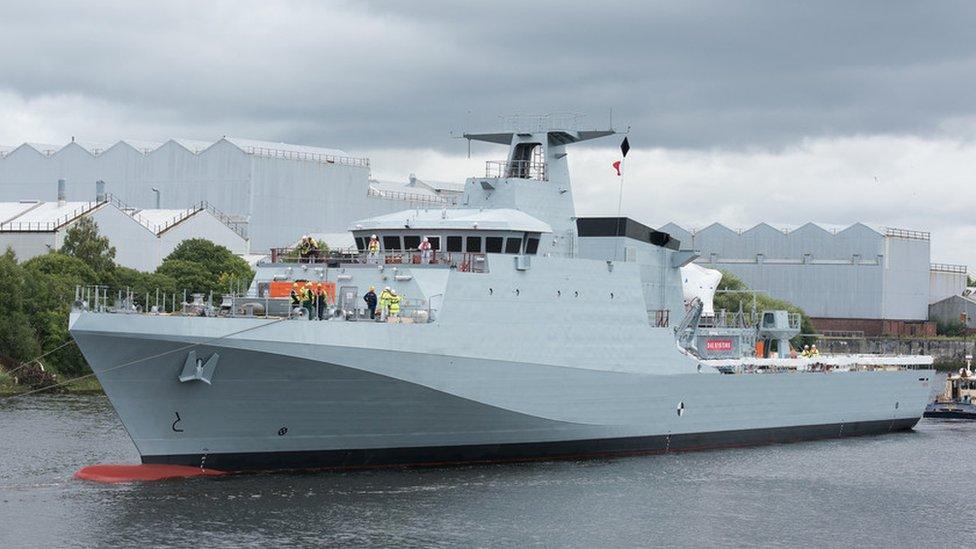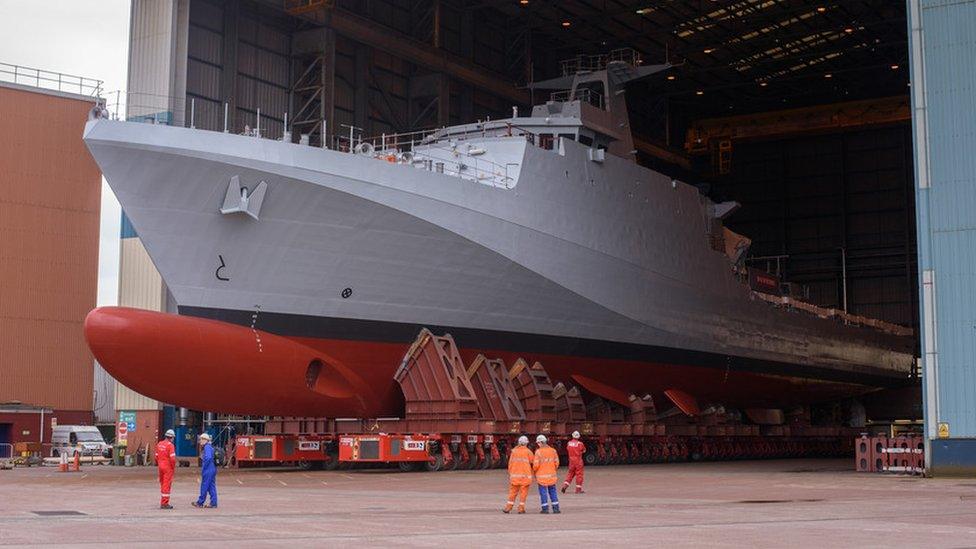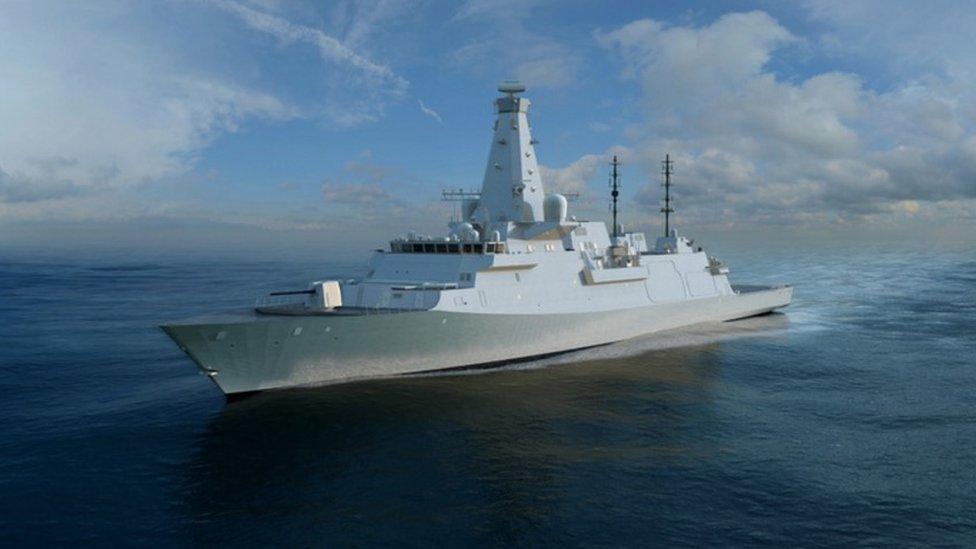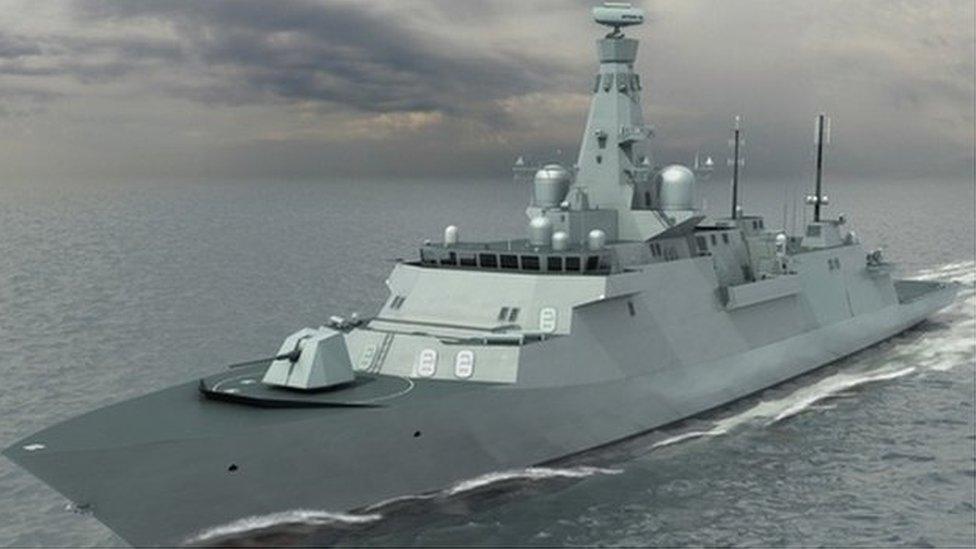Two more Royal Navy patrol vessels to be built at Govan shipyard
- Published

Warship HMS Forth is currently being finished and tested at Scotstoun shipyard
Two more Royal Navy warships are to be built on the Clyde under a deal worth £287m, the UK government has confirmed.
The offshore patrol vessels (OPVs) will be built in Glasgow by BAE Systems under a Ministry of Defence contract.
Workers at BAE's Clyde shipyards are already building three similar vessels for the Royal Navy.
The move will fill a gap in the order book at the yards, where work is due to begin on eight Type 26 frigates next summer.
The contract was confirmed by Defence Procurement Minister Harriett Baldwin during a visit to Govan shipyard.
She said: "This contract will deliver two more modern Offshore Patrol Vessels, HMS Tamar and HMS Spey, for the Royal Navy and safeguard vital shipbuilding skills and hundreds of jobs in Scotland."
HMS Tamar and HMS Spey will be manufactured at the Govan shipyard before being floated to Scotstoun to be fitted out. They are expected to be delivered in 2019.
Iain Stevenson, managing director of BAE Systems Naval Ships, said: "Securing this contract for two further River Class OPVs is testament to the proven capability of the design and the tremendous skill and dedication of employees on the programme."
'Good news'
According to the MoD, work on the five new vessels is sustaining 800 jobs at shipyards on the Clyde, as well as posts at more than 100 companies in the UK supply chain.
The GMB union said the latest contract was "good news for the workers and good news for the Scottish economy".
GMB Scotland organiser Gary Cook said: "This OPV work provides continuity for our members on the Upper Clyde between now and the manufacture of the Type 26 frigate programme.
"The yards support over 2,700 directly employed jobs, generating over £92m in wages - a massive contribution towards the prosperity of communities on the Clyde and the Greater Glasgow area - and we cannot do without them."

HMS Forth was built at Govan shipyard
The contract announcement comes a month after Defence Secretary Michael Fallon said that he hoped to conclude negotiations on the two additional warships "before Christmas".
The government announced plans to order two extra offshore patrol vessels during its Strategic Defence and Security Review last November.
They are used to support counter-terrorism, counter-piracy and anti-smuggling operations.
In August HMS Forth, the first patrol vessel from the earlier order for the Royal Navy, was unveiled on on the Clyde.
It took to the water for the first time as it travelled from the shipyard at Govan, where it was built, to Scotstoun, where it is being finished and tested.
The warship is expected to be delivered to the Royal Navy next year.
Earlier this month Defence Secretary Michael Fallon confirmed that work on eight Type 26 frigates would start at the same yards in 2017.
He said the move would safeguard hundreds of skilled jobs until 2035.
The frigates are principally designed for anti-submarine warfare and the first vessel is due to enter service in the early 2020s.
The promise of new Royal Navy orders to secure the Clyde shipbuilding industry was made before the Scottish independence referendum in 2014.
An £859m initial development deal to build the combat ships, at BAE's Govan and Scotstoun yards on the River Clyde in Glasgow, was signed in February 2015.
But the project has been scaled back from an initial 13 ships to eight and hit by repeated delays, with concerns that jobs could be lost as a result.
The MoD now plans to build a number of smaller, general purpose Type 31 frigates in addition to the Type 26s - but it has not been confirmed where these would be built.
Last week an independent report on Britain's shipbuilding programme, by Sir John Parker, suggested that construction might be shared between different companies across the UK.
A Scottish government spokesperson said: "Clyde ship-building has a world-class reputation and the contract awarded to BAE Systems proves yet again that the company and its workforce have the skills and capabilities to deliver the highest quality vessels.
"It is crucially important that the work promised to Scottish shipyards by the Ministry of Defence is delivered as pledged."
- Published4 November 2016

- Published19 October 2016

- Published31 August 2016

- Published21 July 2016

- Published27 June 2016

- Published7 June 2016
